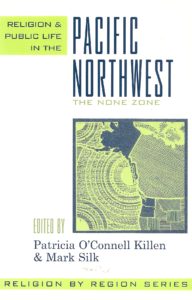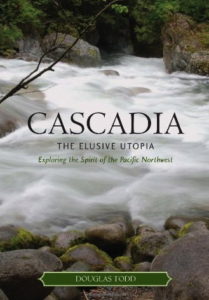Readings on religion and culture in Cascadia.
Religion & Public Life in the Pacific Northwest: The None Zone
When asked their religious identification, more people answer “none” in the Pacific Northwest than in any other region of the United States. But this does not mean that the region’s religious institutions are without power or that Northwesterners who do attend no place of worship are without spiritual commitments.
With no dominant denomination, Evangelicals, Mainline Protestants, Catholics, Jews, adherents of Pacific Rim religious traditions, indigenous groups, spiritual environmentalists, and secularists must vie or sometimes must cooperate with each other to address the regions’ pressing economic, environmental, and social issues.
One cannot understand this complex region without understanding the fluid religious commitments of its inhabitants. And one cannot understand religion in Oregon, Washington, and Alaska without Religion and Public Life in the Pacific Northwest.
Cascadia: The Elusive Utopia
This book will appeal to anyone who wants to understand the unique culture and spirituality of the fast-growing Pacific Northwest, which includes British Columbia, Washington and Oregon.
Envied by people around the world, Cascadia, as it is known, is remarkable for its famed mountains, evergreens, eagles, beaches and livable cities. Most people, however, do not realize that Cascadia, named after the region’s “cascading” waterfalls, is also home to the least institutionally religious people on the continent. Despite their unusual resistance to old ways of doing religion, Cascadia: The Elusive Utopia argues that most of the 14 million residents of this rugged land are eclectically, informally, often deeply “spiritual.”
One could not ask for more insightful Canadians and Americans to explain in lively detail how people in the Pacific Northwest get a sense of belonging out of finding fresh ways to experience the sacred. They do so particularly through the land, which in Cascadia, unlike in most parts of North America, is untamed and spectacular. Many find it overwhelming, humbling.
In this original book, 15 leading writers, historians, bio-regionalists, pollsters, scholars, economists, philosophers, eco-theologians, literary analysts and poets explain how the Pacific Northwest is nurturing a unique “spirituality of place, .” which could become a model for the planet. Brought together by critically-acclaimed Vancouver Sun spirituality writer Douglas Todd, the gifted contributors to this book highlight Cascadians’ unusually strong attraction to personal freedom, do-it-yourself optimism, “secular-but-spiritual” nature reverence and envisioning a healthy future that’s never before been realized: an elusive utopia. Contributors include noted historian Jean Barman, Canadian poet laureate George Bowering, political philosopher Philip Resnick, religion scholar Patricia O’Connell Killen and American-Canadian eco-theologian Sallie McFague.
Evangelical vs. Liberal: The Clash of Christian Cultures in the Pacific Northwest
 The cultural conflict that increasingly divides American society is particularly evident within Protestant Christianity. Liberals and evangelicals clash in bitter competition for the future of their respective subcultures. In this book, James Wellman examines this conflict as it is played out in the American Northwest.
The cultural conflict that increasingly divides American society is particularly evident within Protestant Christianity. Liberals and evangelicals clash in bitter competition for the future of their respective subcultures. In this book, James Wellman examines this conflict as it is played out in the American Northwest.
Drawing on an in-depth study of twenty-four of the area’s fastest-growing evangelical churches and ten vital liberal Protestant congregations, Wellman captures the leading trends of each group and their interaction with the wider American culture. He finds a remarkable depth of disagreement between the two groups on almost every front.
Where evangelicals are willing to draw sharp lines on gay marriage and abortion, liberals complain about evangelical self-righteousness and disregard for personal freedoms. Liberals prefer the moral power of inclusiveness, while evangelicals frame their moral stances as part of a metaphysical struggle between good and evil. The entrepreneurial nature of evangelicalism translates into support of laissez-faire capitalism and democratic political advocacy. Liberals view both policies with varying degrees of apprehension. Such differences are significant on a national scale, with implications for the future of American Protestantism in particular and American culture in general.
Both groups act in good faith and with good intentions, and each maintains a moral core that furthers its own identity, ideology, ritual, mission, and politics. In some situations, they share similar attitudes despite having different beliefs. Attending church services and interviewing senior pastors, lay leaders and new members, Wellman is able to provide new insights into the convenient categories of “liberal” and “evangelical,” the nature of the conflict, and the myriad ways both groups affect and are affected by American culture.



Recent Comments